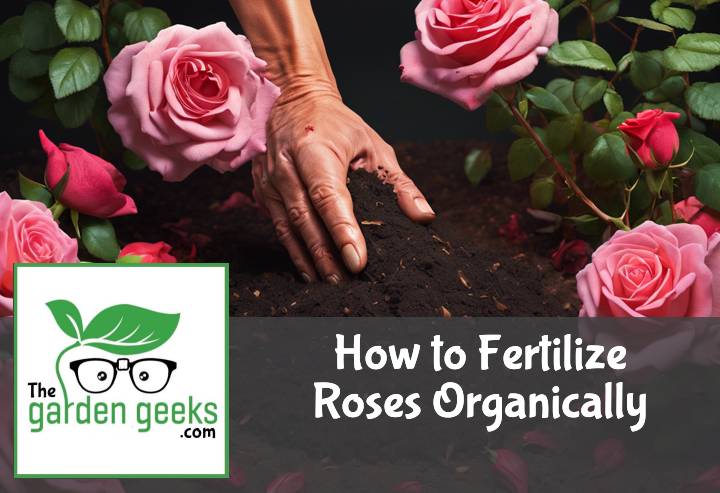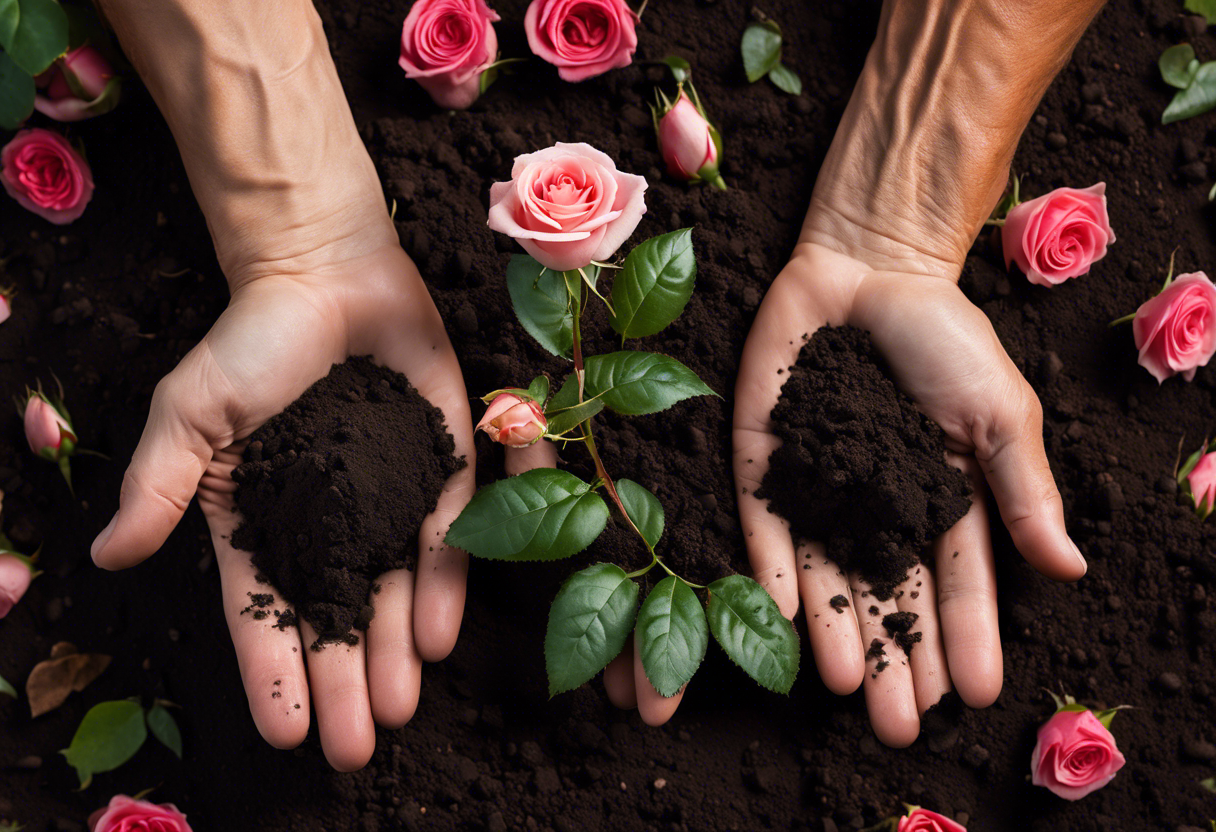Ever tried to grow roses, only to end up with a garden full of sad, droopy blooms? Yeah, been there, done that. But then I discovered the magic of organic fertilization. You might ask why bother going organic? Well, it’s like giving your roses a superfood smoothie instead of a junk food binge. Learn more about How to Fertilize Roses Organically and trust me, your roses will thank you.
In this blog post, we’ll be exploring five methods that actually work when it comes to organic rose fertilization. It’s not rocket science but rather some good ol’ Mother Nature techniques mixed with a bit of patience and love. So buckle up and get ready for the ride! Keep reading about How to Fertilize Roses Organically (5 Methods That Actually Work).
Key Takeaways
- Use compost as a natural fertilizer, rich in nutrients and beneficial microorganisms.
- Banana peels provide potassium, essential for rose health.
- Coffee grounds add nitrogen to the soil, promoting leaf growth.
- Eggshells offer calcium, strengthening plant cell walls.
- Epsom salt can boost magnesium levels, enhancing photosynthesis and flower production.
Remember to balance these methods with proper watering and sunlight exposure for optimal results.
Understanding Organic Fertilization
Let’s dive into the world of organic fertilization. It’s a big deal in the gardening universe, especially when it comes to roses. Why? Well, it’s all about boosting soil health and giving your roses a natural, nutrient-rich diet. We’ll be exploring this topic further by looking at what organic fertilization is and why it’s the bee’s knees for roses.
What is Organic Fertilization?
So, what exactly is organic fertilization? It’s like a superfood smoothie for your plants. Instead of synthetic chemicals, organic fertilizers use natural materials like compost or bone meal. These ingredients are rich in nutrients that plants need to grow.
The magic happens through the nutrient cycle in organic fertilizing. As these natural materials break down, they release nutrients into the soil. This process feeds your plants and improves soil structure over time. It’s a win-win situation!
Why Choose Organic Fertilization for Roses?
Now you might be wondering why go organic for roses specifically? Well, roses love a good meal and organic fertilizer provides just that! The benefits of organic fertilizer for roses are plenty.
Firstly, it enhances rose health with organic fertilizer by providing them with balanced nutrition. Unlike synthetic options which can cause nutrient imbalances, organic fertilizers release nutrients slowly and steadily.
Secondly, using an organic fertilizer can boost growth rate too! With all those yummy nutrients available, your rose bushes will be blooming like there’s no tomorrow! So if you’re wondering how to fertilize roses organically, stay tuned as we explore some effective methods next!
The Importance of Soil Health in Rose Gardening
Soil health is the heart and soul of rose gardening. It’s like the foundation of a house – if it’s not strong, everything else falls apart. And just as you wouldn’t build a mansion on quicksand, you shouldn’t expect beautiful roses from poor soil.
Role of Soil in Rose Growth
The quality of your soil directly influences rose growth. Roses are pretty demanding plants, they need a buffet of nutrients to thrive. The main course includes nitrogen for leaf growth, phosphorus for root development and potassium for overall health.
These essential nutrients are absorbed through the roots from the soil. If your soil is lacking in any of these, your roses might start throwing tantrums in the form of yellow leaves or stunted growth. So remember, healthy roses start with nutrient-rich soil!
How to Test and Improve Soil Health
Testing your soil health isn’t as complicated as it sounds. You can get a basic soil test kit from any garden center that will tell you what’s going on beneath the surface.
If your results show that your soil is more ‘junk food’ than ‘nutrient-rich’, don’t panic! There are plenty of organic methods to improve its quality. Composting is a great way to add those much-needed nutrients back into the ground.
Another method is crop rotation – this involves planting different types of plants in your garden each year to prevent nutrient depletion. With these techniques, you’ll be well on your way to creating an optimal environment for rose growth, leading to a healthier garden overall!
Method 1: Composting for Roses
Composting is a fantastic way to fertilize roses organically. It’s a sustainable method that enriches the soil and promotes healthy rose growth. Plus, it’s great for the environment!
What is Composting?
Composting, in simple terms, is recycling organic waste into nutrient-rich soil amendment. It’s like giving your roses a gourmet meal made from kitchen scraps and yard waste. The benefits of composting are numerous, especially in organic rose gardening.
Firstly, it provides a natural fertilizer that’s chock-full of nutrients essential for rose health. Secondly, it improves soil structure and water retention – both crucial for those thirsty rose roots. And lastly, it promotes beneficial microbial activity in the soil, which helps keep your roses disease-free.
How to Create a Compost Pile for Roses
Creating a compost pile tailored for roses isn’t rocket science. It just needs a bit of time and the right ingredients.
Start by choosing an accessible spot in your garden where you can easily add materials and turn the compost pile. Next up is layering organic materials – think green (like vegetable scraps) and brown (like dried leaves). These provide nitrogen and carbon respectively, both vital for composting.
Keep the pile moist but not soggy – think “damp sponge” levels of wetness. Turn it every few weeks to help speed up decomposition and distribute heat evenly throughout the pile.
And voila! In a few months’ time, you’ll have rich, dark compost ready to be mixed into your rose beds as an effective rose-friendly compost. Remember folks – when figuring out how to fertilize roses organically, don’t underestimate the power of good ol’ compost!
Method 2: Using Animal Manures as Fertilizer
When it comes to organic rose fertilization, don’t turn your nose up at animal manure. It’s a top-notch natural rose fertilizer, packed with nutrients that roses love. Plus, it’s a great way to recycle waste and contribute to sustainable gardening.
Types of Animal Manure Suitable for Roses
So, what types of animal manure work best for roses? Let’s break it down.
First off, we’ve got cow manure for roses. It’s rich in nitrogen and composts well, making it a solid choice.
Next up is chicken manure. The benefits of this stuff are pretty clucking good! It’s high in phosphorus, which helps roses bloom beautifully.
Horse manure also makes the cut as an effective fertilizer. While not as nutrient-dense as cow or chicken poop, it breaks down slowly and improves soil structure over time.
Rabbit droppings are another winner. They’re packed with nitrogen and won’t burn your plants like some other manures can.
Finally, don’t forget about goat dung. Its small size allows for quick breakdown and nutrient release, giving your roses a fast food option!
How to Apply Animal Manure Safely and Effectively
Alrighty then! Now that we know our options let’s talk about how to apply these natural fertilizers safely and effectively.
First things first: never use fresh manure directly on your roses – you’ll risk burning them or spreading diseases. Instead, compost the manure first or buy pre-composted products.
Next step: spread the composted manure around the base of your rose bushes but avoid touching the stems directly. This method is often referred to as “side dressing”.
Finally, water thoroughly after application to help the nutrients seep into the soil.
And voila! You now know how to fertilize roses organically using animal manure. Just remember, every poop has its pros and cons, so choose the one that suits your garden’s needs best!
Method 3: Green Manuring with Cover Crops
Green manuring is a fantastic way to fertilize roses organically. It’s all about enriching the soil using cover crops. This method of organic fertilization not only boosts your rose’s health but also improves the overall soil structure.
What are Cover Crops?
Cover crops, my friends, are plants grown primarily for their soil-enhancing capabilities. They’re like the superheroes of green manuring, swooping in to save your roses from nutrient deficiency! These little green warriors work wonders for soil improvement, helping your roses thrive.
But wait, there’s more! Cover crops also protect against soil erosion and suppress pesky weeds. So, they’re not just good for your roses; they’re great for your entire garden!
Choosing and Growing the Right Cover Crops for Roses
Now you might be wondering, “How do I choose the right cover crops?” Well, it depends on a few factors. You need to consider your climate, soil type, and what nutrients your roses need most.
Once you’ve chosen the best cover crops for roses, it’s time to get planting! Remember to rotate them regularly as part of your organic rose care routine. This helps keep the soil balanced and full of life.
So there you have it – green manuring with cover crops: an organic solution that truly works wonders for rose gardening!
Method 4: Using Organic Commercial Fertilizers
When it comes to nourishing roses organically, don’t overlook the power of organic commercial fertilizers. These products can provide your roses with all the nutrients they need, as long as you choose high-quality ones and apply them correctly.
Identifying High-Quality Organic Commercial Fertilizers
So, how do you identify a high-quality organic fertilizer? Well, start by checking out the ingredients. Quality organic fertilizers will have a mix of essential nutrients like nitrogen, phosphorus, and potassium.
Next up is brand reputation. Go for reputable fertilizer brands that are known for their commitment to organic farming practices. They’re more likely to produce reliable products that live up to their claims.
Finally, don’t forget about user reviews. What are other gardeners saying about these fertilizers? Positive user reviews on fertilizers can give you confidence in your choice.
Correct Application of Organic Commercial Fertilizers on Roses
Now that you’ve got your hands on some quality stuff, let’s talk about how to use it. The key here is correct application – it’s not just about what you apply, but how and when.
Timing is crucial when it comes to applying organic fertilizer. The best time is early spring when roses start their growth spurt.
The quantity matters too! Too much of a good thing can be harmful so follow the instructions on the package for the right quantity of fertilizer for roses.
And finally, technique! Sprinkle the fertilizer around the base of the plant without letting it touch the stem or leaves – this is an optimal technique for applying fertilizer.
Remember folks, learning how to fertilize roses organically isn’t rocket science – it just takes a bit of knowledge and care!
Method 5: Making Homemade Liquid Feeds
Alright, let’s dive into the world of DIY plant nutrition! How to Fertilize Roses Organically? One way is by making homemade liquid feeds. It’s a fantastic part of organic rose care, and guess what? It’s as effective as it sounds!
Benefits of Homemade Liquid Feeds
Now, you might be wondering why you should bother with this. Well, there are quite a few reasons. First off, it’s cost-effective. You’re using stuff you probably already have at home, so say goodbye to expensive store-bought fertilizers.
Secondly, you get control over what goes into your fertilizer. That means no nasty chemicals that could harm your roses or the environment. Speaking of which, this method is super eco-friendly. So not only are you taking care of your roses but also doing your bit for Mother Earth.
Finally, there’s something satisfying about providing cost-effective rose nutrition yourself. It’s like cooking a meal from scratch – rewarding and beneficial!
Recipes for Effective Homemade Liquid Feeds
Okay, now onto the fun part – recipes! The first one involves kitchen scraps like banana peels and coffee grounds. Just blend them with water and voila! You’ve got an effective liquid feed.
Another recipe involves compost tea. Simply soak some compost in water for a couple of days and strain it out. This nutrient-rich ‘tea’ can then be used to water your roses.
Remember folks; these are just guidelines! Feel free to experiment with different ingredients based on what your roses need most.
So there you have it – preparing organic feed at home isn’t as daunting as it seems! With these easy liquid feed recipes, you’ll be well on your way to mastering the art of natural rose feeding.
To Wrap Up
In the end, fertilizing roses organically is like making a perfect cup of coffee – it’s all about getting the right blend. We’ve brewed up 5 methods that actually work, so your roses can thrive without any chemical jitters. Check out our How to Fertilize Roses Organically guide for more details.
So, don your gardening gloves and get ready to brew some magic in your rose garden. Remember, every rose has its thorn but with the right organic fertilizer, they’ll be blooming beautifully in no time!





